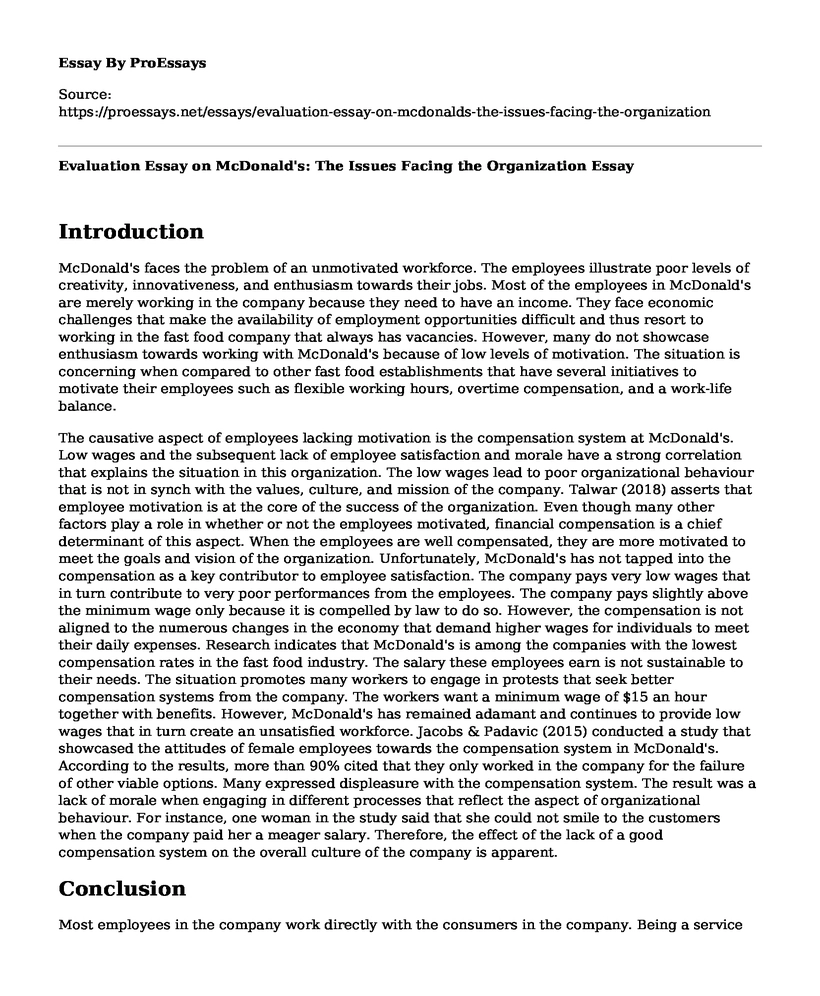Introduction
McDonald's faces the problem of an unmotivated workforce. The employees illustrate poor levels of creativity, innovativeness, and enthusiasm towards their jobs. Most of the employees in McDonald's are merely working in the company because they need to have an income. They face economic challenges that make the availability of employment opportunities difficult and thus resort to working in the fast food company that always has vacancies. However, many do not showcase enthusiasm towards working with McDonald's because of low levels of motivation. The situation is concerning when compared to other fast food establishments that have several initiatives to motivate their employees such as flexible working hours, overtime compensation, and a work-life balance.
The causative aspect of employees lacking motivation is the compensation system at McDonald's. Low wages and the subsequent lack of employee satisfaction and morale have a strong correlation that explains the situation in this organization. The low wages lead to poor organizational behaviour that is not in synch with the values, culture, and mission of the company. Talwar (2018) asserts that employee motivation is at the core of the success of the organization. Even though many other factors play a role in whether or not the employees motivated, financial compensation is a chief determinant of this aspect. When the employees are well compensated, they are more motivated to meet the goals and vision of the organization. Unfortunately, McDonald's has not tapped into the compensation as a key contributor to employee satisfaction. The company pays very low wages that in turn contribute to very poor performances from the employees. The company pays slightly above the minimum wage only because it is compelled by law to do so. However, the compensation is not aligned to the numerous changes in the economy that demand higher wages for individuals to meet their daily expenses. Research indicates that McDonald's is among the companies with the lowest compensation rates in the fast food industry. The salary these employees earn is not sustainable to their needs. The situation promotes many workers to engage in protests that seek better compensation systems from the company. The workers want a minimum wage of $15 an hour together with benefits. However, McDonald's has remained adamant and continues to provide low wages that in turn create an unsatisfied workforce. Jacobs & Padavic (2015) conducted a study that showcased the attitudes of female employees towards the compensation system in McDonald's. According to the results, more than 90% cited that they only worked in the company for the failure of other viable options. Many expressed displeasure with the compensation system. The result was a lack of morale when engaging in different processes that reflect the aspect of organizational behaviour. For instance, one woman in the study said that she could not smile to the customers when the company paid her a meager salary. Therefore, the effect of the lack of a good compensation system on the overall culture of the company is apparent.
Conclusion
Most employees in the company work directly with the consumers in the company. Being a service industry, a majority of the employees communicate with the consumers on a frequent basis. Given the nature of the competition in the service industry, it is apparent the customer service determines how successful an organization will be. The interactions with the consumers influence loyalty and create a competitive edge that facilitates success. Therefore, the employees have to be motivated to interact with the consumers in a way that reflects the values of the organization. The employees at McDonald's may not be able to showcase enthusiasm and pass along the joyful spirit when they are not adequately compensated. The average employee in the company makes $9 an hour. The same employee is expected to work for long shifts, smile at the customers, talk to them, and provide a personalized approach to the company's services. The whole process is exhaustive to a staff that is not well-motivated. The employees will always harbour negative feelings that affect their customer service in the long-run.
References
Jacobs, A.W. and Padavic, I., 2015. Hours, Scheduling and Flexibility for Women in the US LowWage Labour Force. Gender, Work & Organization, 22(1), pp.67-86.
Kultalahti, S. and Viitala, R., 2015. Generation Y-challenging clients for HRM?. Journal of Managerial Psychology, 30(1), pp.101-114.
Talwar, J., 2018. Fast food, fast track: Immigrants, big business, and the American Dream. Routledge.
Cite this page
Evaluation Essay on McDonald's: The Issues Facing the Organization. (2022, May 16). Retrieved from https://proessays.net/essays/evaluation-essay-on-mcdonalds-the-issues-facing-the-organization
If you are the original author of this essay and no longer wish to have it published on the ProEssays website, please click below to request its removal:
- Texas Legislature Sessions Essay
- Human Resource and Operation Management Paper Example
- Statement of Purpose for Nursing School Paper Example
- Foothill College Director Interview Example
- Essay Sample on Grief and Loss Theory in Social Work Practice
- Essay Example on Joel Brady: An Impressive Strategy Director in Advertising
- Essay Example on Glass Ceiling: Invisible Barrier for Women, Minorities in Trade Hierarchy







